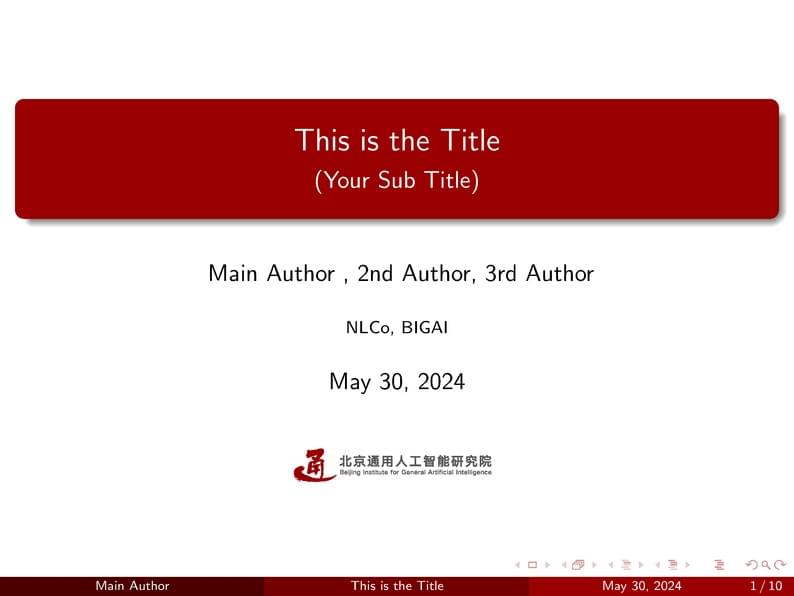
bigai_beamer
Author:
fringsoo
Last Updated:
2 years ago
License:
Creative Commons CC BY 4.0
Abstract:
Beamer template for BIGAI.

\begin
Discover why over 25 million people worldwide trust Overleaf with their work.

\begin
Discover why over 25 million people worldwide trust Overleaf with their work.
\documentclass{beamer}
%\usepackage[T1]{fontenc}
\usepackage[utf8]{inputenc}
%\usepackage{lmodern} % Use the Latin Modern font family
\usepackage{latexsym,amsmath,xcolor,bm, amssymb, color, tikz, graphicx, amsthm, mathtools}
\usepackage{algorithm}
\usepackage{algorithmic}
\usepackage{hyperref}
\usepackage{float}
\usepackage{CJKutf8}
% \usetikzlibrary{external}
% \tikzexternalize[prefix=tikz/]
\DeclareMathOperator*{\argmax}{arg\,max}
\DeclareMathOperator*{\argmin}{arg\,min}
\DeclareMathOperator{\sign}{sign}
\DeclareMathOperator{\Tr}{Tr}
\makeatletter
\DeclareRobustCommand\onedot{\futurelet\@let@token\@onedot}
\def\@onedot{\ifx\@let@token.\else.\null\fi\xspace}
\def\eg{\emph{e.g}\onedot}
\def\Eg{\emph{E.g}\onedot}
\def\ie{\emph{i.e}\onedot}
\def\Ie{\emph{I.e}\onedot}
\def\cf{\emph{c.f}\onedot}
\def\Cf{\emph{C.f}\onedot}
\def\etc{\emph{etc}\onedot}
\def\vs{\emph{vs}\onedot}
\def\wrt{w.r.t\onedot}
\def\dof{d.o.f\onedot}
\def\etal{\emph{et al}\onedot}
\makeatother
\usetheme{Madrid}
% \usecolortheme{default}
\definecolor{BIGAIGray}{RGB}{94,90,91}
\definecolor{BIGAIRed}{RGB}{155,0,0}
\usecolortheme[named=BIGAIRed]{structure}
%\setbeamertemplate{blocks}[rounded][shadow=true]
%\setbeamercolor{block title}{fg=blue}
%\setbeamercolor{block body}{fg=black,bg=white}
%\setbeamercolor{title}{fg=white, bg=BIGAIRed}
%\setbeamerfont{title}{shape=\bfseries,size=\Large}
%\setbeamerfont{author}{shape=\bfseries}
%\setbeamercolor{frametitle}{fg=red}
%------------------------------------------------------------
%This block of code defines the information to appear in the
%Title page
\title %optional
{This is the Title}
\subtitle{(Your Sub Title)}
%\subtitle{with applications to persuation and lie production}
% \author % (optional)
% {Author Name}
\author[Main Author]{
Main Author ,
2nd Author,
3rd Author }
\institute[]{NLCo, BIGAI}
\titlegraphic{\includegraphics[trim=20cm 25cm 12cm 25cm,clip,height=1cm,keepaspectratio]{BIGAI-logo-combine.pdf}}
%\href{https://www.bigai.ai/}{%
%End of title page configuration block
%------------------------------------------------------------
%------------------------------------------------------------
%The next block of commands puts the table of contents at the
%beginning of each section and highlights the current section:
\AtBeginSection[]
{
\begin{frame}
\frametitle{Outline}
\tableofcontents[currentsection]
\end{frame}
}
%------------------------------------------------------------
\begin{document}
%The next statement creates the title page.
\frame{\titlepage}
\logo{%
\makebox[0.98\paperwidth]{
\href{https://www.bigai.ai/}{\includegraphics[height=0.15cm,keepaspectratio]{bigai_logo_txt.pdf}}
\hfill \href{https://www.bigai.ai/}{\includegraphics[trim=20cm 41cm 40cm 11cm,clip,height=0.75cm,keepaspectratio]{BIGAI-logo-combine.pdf}}%
}
}
%---------------------------------------------------------
%This block of code is for the table of contents after
%the title page
\begin{frame}
\frametitle{Outline}
\tableofcontents
\end{frame}
%---------------------------------------------------------
\section{Part1}
\begin{frame}{Topic1}
Hello world! \cite{wang2020persuasion}
\begin{itemize}
\item Introduction
\item Task Formulation
\end{itemize}
\end{frame}
\begin{frame}{Dynamic Function}
\begin{figure}[h!]
\centering
\includegraphics{overleaf-logo.pdf}
\caption{\textbf{Temporal evolution of $t$.} }
\label{fig:forward}
\end{figure}
\end{frame}
\begin{frame}{Topic2}
\begin{itemize}
\item $a \in $ $\mathcal{A}=$\{alice, bob, ...\}
\end{itemize}
\begin{CJK*}{UTF8}{gbsn}
\textit{可以输入中文}\\
\end{CJK*}
\begin{example}
$u_m$ can be:
\begin{equation}
\begin{CJK*}{UTF8}{gbsn}
u_m = \begin{cases}
\textrm{苹果}, & if~~a == \textrm{``apple''} \\
\textrm{我不想回答你的问题}, & if~~a == \textrm{``refuse''} \\
\vdots & \vdots
\end{cases}
\nonumber
\end{CJK*}
\end{equation}
\end{example}
\end{frame}
\begin{frame}{Formalization}
\begin{definition}[Def1]
A $t-1$ turn dialogue:
\begin{equation}
H^t := \{(u_u^{1}, pg^{1}, u_m^{1}), \cdots, (u_u^{t-1}, pg^{t-1}, u_m^{t-1})\},
\end{equation}
where $pg$ is the observation .
\end{definition}
\end{frame}
\section{Part2}
\begin{frame}[fragile]{Forward Algorithm}
\begin{algorithm}[H]%[!ht]
\small
\caption{Forward algorithm.}
\label{alg:algorithm}
\begin{algorithmic}%[1]
\REQUIRE Transition model $\mathcal{T}$, value score model $\mathcal{F}$.
\STATE Compute $\bm{\alpha}^1$.
\FOR{$i = 2$ to $t-1$}
\STATE Obtain $v_+^i$ using the model in \ref{fig:forward}.
\IF{$i == t-1$}
\STATE Compute $V_+(a)$ using $\bm{\alpha}^{t-1}$.
\ENDIF
\ENDFOR
\RETURN $V_+(a)$ as a function.
\end{algorithmic}
\end{algorithm}
\end{frame}
\begin{frame} [allowframebreaks]\frametitle{References}
\bibliographystyle{apalike}
\bibliography{ref}
\end{frame}
\end{document}